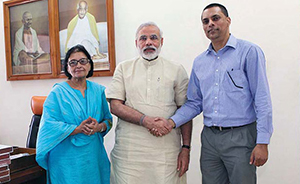An Agenda For Change
Former Indian Prime Minister Atal Bihari Vaypayee, in his address to the Antar Rashtriya Sahyog Parishad (ARSP) in New Delhi in 2000, which is the forerunner parley to today’s annual Bharitya Pravsai Diwas (PBD) noted that there were different forces of history that our people, “to leave India and settle abroad. This kind of trans-national movement of people will only accelerate in the increasingly inter-dependent and inter-connected world of the 21st century.”
Vaypayee continued: “The expansion of the Indian Diaspora in the new century and new millennium however, will follow a very different trajectory. In the past, people left India out of distress or some economic compulsion, because ours was then a country under colonial subjugation. This will no longer be the case in the future.”
The early entry of Indian investors in steel and other manufacturing industries have led to a growing Indian business presence in the Caribbean region based in Trinidad and Tobago. Since 1845, two members of the Indian Diaspora have become Prime Ministers. Firstly, it was Basdeo Panday, and the incumbent, Mrs. Kamla Persad-Bissessar, the first woman, and a Hindu as well. Both of have visited India while in office, and Prime Minister Bissessar was awarded the PBD in 2012.
The visits of both Prime Ministers were to a large extent an attempt to explore new prospects for co-operation. Indian banking and insurance interests have made forays into the local financial services industry. Following from India’s continued cultural and religious links, scholarships in various disciplines continue to be offered and Indian professionals have been playing a role in education and information technology.
We must continue to add to the cultural frontiers. Indo-Trinidadians have made a serious statement via the political arena through its cultural penetration. Like calypso and steelpan which our African brothers claimed to develop and to demonstrate, Indo-Trinidadians can now claim to the production of the famous chutney presentations, which have now been factored on the entertainment stage.
The Diaspora’s contribution to Trinidad and Tobago co-operates with every facet of the politics and sociology as well. One can easily recognize the commonality of the two distinct races in the arena of cultural presentations.
The celebration of Divali, Phagwa, Ram Leela, Hosay, yagnas and other cultural episodes is intricately linked as major contributions of the Indian Diaspora. We must never forget the presentations of Divali Nagar which has caused the national and international imagination.
The contribution of Indian culture in Trinidad and Tobago is well-noted and it is now being comprehensively documented. Media portrayals continue to improve and expand.











Comments.